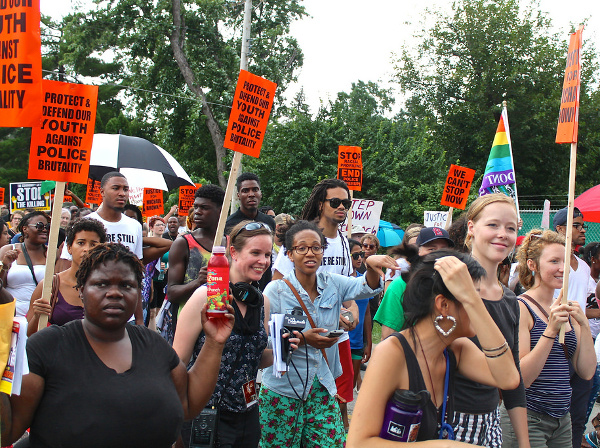
PHOTO/BOB SIMPSON
CARBONDALE, IL — Ferguson, Missouri, like many other working-class communities across the country, has undergone many changes since the industrial boom era of post WWII. Once a thriving community, it is now plagued with poverty much like the town in which I reside 100 miles southeast of St. Louis. Home to Emerson Electric, a $24 billion multi-national corporation just down the road from the neighborhood where Michael Brown faced his executioner, the St. Louis suburb has a history of racial and income disparity which has carried over into the post-industrial present. As the tax base dwindled, those who could, both Blacks and whites, fled to areas with better funded schools and services. Much of the northern area of St. Louis County mirrors Ferguson. Unemployment and underemployment is rampant, with nearly 50% of Black men in their twenties unemployed in many communities.
When the community gathered in protest following Michael’s murder, the militarized police response evoked a righteous defiance especially among the youth who are fed up with the daily police occupation and harassment of their community. Calling the protesters “f—ing animals” and launching tear gas into their peaceful demonstration only strengthened the youths’ resolve to take back the streets. “Enough is enough” was their battle cry.
Revealed through interviews of residents, it is now known that the second source of revenue in Ferguson is from petty fines and fees, especially traffic tickets. In 2013 alone, $2.6 million was collected, nearly twice the amount of the two years prior. In north St. Louis County, this is the norm with upwards of 40% of revenue annually from such fines. It is a vicious cycle that keeps the poor in a constant state of stress and despair.
But this is not unique to north St. Louis County communities. It is happening everywhere there are communities of poor underemployed and unemployed working class families of all ethnic backgrounds. Here in southern Illinois, police departments are making more stops, issuing fines and collecting exorbitant fees to enhance revenue. One local police department accepted federal grant money which requires officers to write more citations, a slippery slope for sure. What has followed is increased harassment and abuse, especially of the poor, students and the homeless.
“To Prison For Poverty,” from Brave New Films, documents the system that allows private probation companies to profit from charging excessive fees to low-income people who can’t pay in Georgia and Alabama.
Whether jailed or kept in a state of poverty and fear trapped in our communities, we are at the mercy of predatory corporations and the police that protect this system. We must open our eyes and see that the same system that executed Michael Brown in Ferguson is the same system that killed many others who are deemed expendable human beings by a system that no longer needs our labor.
Let us unite with the youth in Ferguson and around the world who are saying “Enough is enough!” Let’s take back our birthright and create a world of sharing and caring for our brothers and sisters!
Cathy Talbott is a former telephone operator, a job lost to automation. She was a homeless mother of two and fights for welfare rights. A former co-host of a weekly community radio program out of Carbondale, IL, “Occupy the Airwaves,” Cathy is the Environmental Desk for the People’s Tribune.
